Tourniquets Miscellaneous Medical Equipment

TOP: Tourniquet & Forceps, manufactured by Mine Safety Appliances Co., Pittsburgh, Pennsylvania
MIDDLE: Tourniquet, Forceps, and Scissors, manufactured by Handy Pad Supply Co., Worcester, Massachusetts
BOTTOM: Blunt Scissors, Blunt Forceps, and US Army Tourniquet, distributed by Davis Emergency Equipment Co., Inc., Newark, New Jersey
Tourniquets are mechanical devices used instead of, or to replace, manual compression of a main arterial trunk. A Tourniquet generally consists of a firm pad and tight band to hold the pad in place and press it down upon a large artery and so interrupt its flow of blood. The Tourniquet is a most useful device, the prompt use of which has saved many lives. It is however dangerous in unskilled hands and should therefore be used with the greatest caution.
A Tourniquet can be improvised, it may be a tight wad of cloth, or some hard object, such as a block of wood, a cork, or a smooth stone, wrapped in some soft material which is used as a compress (this method is called Spanish windlass). The band may be a handkerchief, necktie, suspender, waist belt, sock, bandage, or similar article that will make a strong flat band. A broad rubber (elastic) band is more effective and less painful than non-elastic bands. A simple rubber-tubing was effectively used as a one-handed device, low in size and weight, and easy to use. The version with pad is placed over the area to which pressure is to be applied: the band is then placed around the arm or leg, over the pad, and tightened by hand or with the assistance of a “twist”. For this, a stick, bayonet, or scabbard is passed under the band and twisted until the bleeding ceases. A Tourniquet is always recommended in case of arterial hemorrhage, when elevation of the wound and/or direct pressure fail.
Recommendations and general principles when using a Tourniquet:
- The Tourniquet should never be used when its application is unnecessary
- The Tourniquet should never be tighter than is necessary to check bleeding
- The Tourniquet should never be hidden by clothing or a bandage
- The Tourniquet should be removed as soon as its use becomes unnecessary
The most common abuse in using a Tourniquet are: unnecessary too tight – hidden – left on too long. Not oftener than every half hour, nor less often than once an hour, carefully loosen the tourniquet and note whether bleeding starts again. If it does bleed, tighten the tourniquet again. Always mark “TOURNIQUET” plainly on the patient’s EMT, and add the time. If he is conscious, also caution him to tell medical attendants that he has a tourniquet on. If a tourniquet is left on continuously for as long as 6 hours, amputation of the extremity may be necessary (as it may cause gangrene or death of subject limb or part).
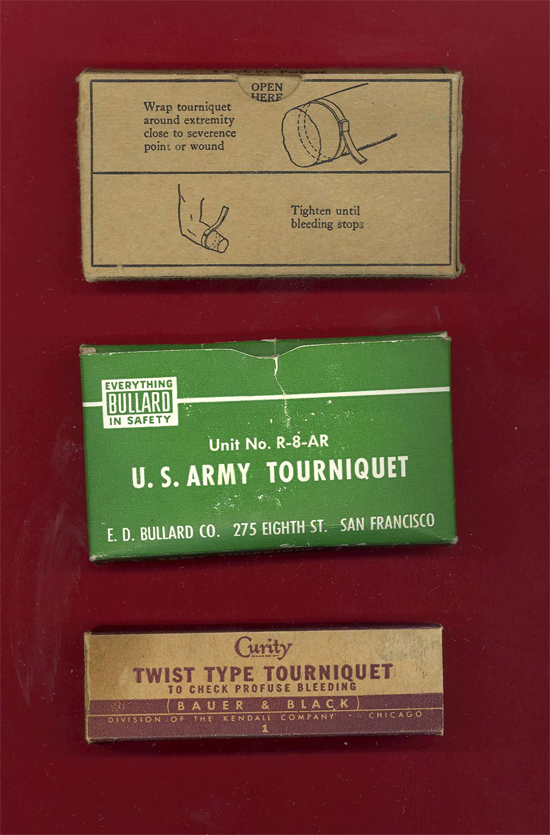
TOP: Tourniquet, Tweezers, Scissors, distributed by The American National Red Cross, Washington, D.C.
MIDDLE: US Army Tourniquet, distributed by E. D. Bullard Co., San Francisco, California
BOTTOM: Twist Type Tourniquet, manufactured by Curity, and distributed by Bauer & Black, Division of The Kendall Company, Chicago, Illinois
The article uses as basic references Medical Department Supply Catalogs issued by the War Department. It must be noted that Tourniquets are listed under different classifications:
Class 3 – Items in the 30000-39990 range: Surgical Appliances, Miscellaneous Diagnostic Instruments and Surgical Supplies
Class 9 – Items in the 91000-99990 range: Field Equipment and Supplies
Note: Items with IWIS > “Issue While In Stock” indication, are those for which purchase for the Army was discontinued, but for which stock remaining from previous purchases was still issued until supply was exhausted.
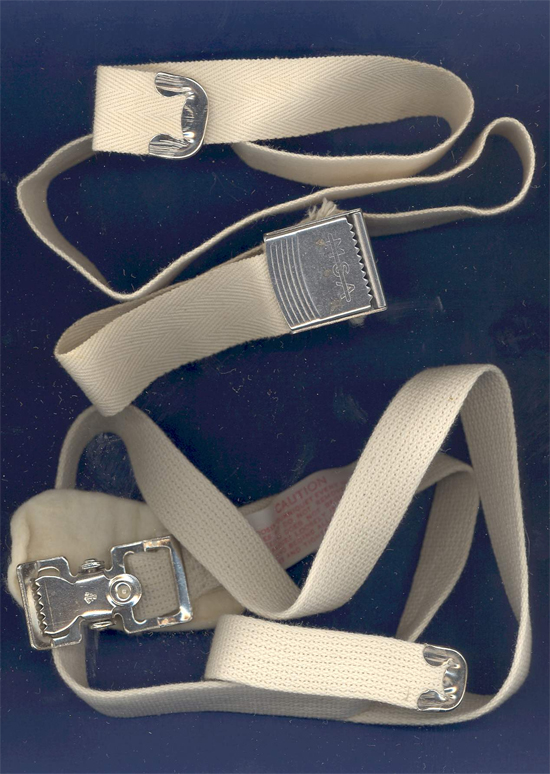
TOP: Tourniquet, manufactured by Mine Safety Appliances Co., Braddock, Pittsburgh, Pennsylvania
BOTTOM: Tourniquet, manufactured by E.D. Bullard Co., San Francisco, California
Item 35405 – Tourniquet, Lobectomy
Item 38650 – Tourniquet, Esmarch
Class 9 – Subheading: Miscellaneous Surgical Instruments, Appliances and Supplies
Item 93780 – 95 – Tourniquet, Field
Item 93780 – Tourniquet, Field
Item 93790 – Tourniquet, Field (IWIS)
Item 93795 – Tourniquet, Kirk: 2 in Set
Item 93797 – Tourniquet-Scissors-Forceps Set: consists of 1 Tourniquet, 1 Pair of Double-Blunt, 4-Inch Scissors, and 1 3 ½-Inch Forceps
Item 35405 – Tourniquet, Lobectomy: Bethune
Item 38650 – Tourniquet, Esmarch: Rubber, 36 by 7/8-Inch Chain, 9 Inches (IWIS). There was another simple version consisting of a 6-Foot Rubber-Tubing, ½-Inch wide, easy to apply with one hand, and reliable to achieve effective occlusion of arterial bleeding (item number, unknown)
Item 93780 – Tourniquet, Field
Item 93790 – Tourniquet, Field, Web (introduced 11 Feb 44) (reinstated 1 Apr 44)
Item 93795 – Tourniquet, Kirk: 2 in Set (introduced 1 Jan 44)
Item 93797 – Tourniquet-Scissors-Forceps Set: consists of 1 Tourniquet, 1 Pair of Double-Blunt, 4-Inch Scissors, and 1 3 ½-Inch Forceps (introduced 15 May 44)
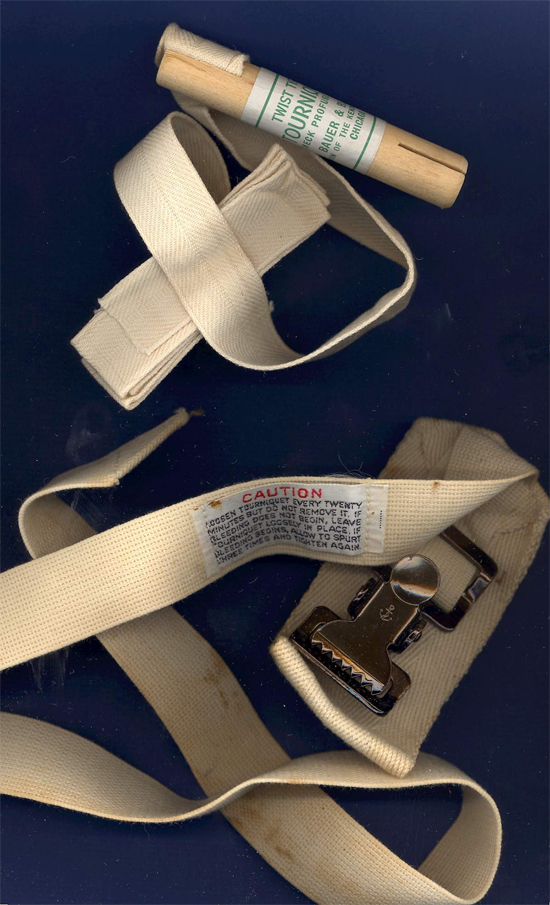
TOP: Tourniquet, manufactured by Bauer & Black, Division of The Kendall Company, Chicago, Illinois
BOTTOM: Tourniquet, manufactured by Davis Emergency Equipment Co., Inc., Newark, New Jersey
Section II of subject Supply Catalog includes following Medical Department Assemblages Parts & Components Parts:
Class 9 – Subheading: Item 93310, Supplemental Instrument Set, Fractures and Amputations, Orthopedic (1942 Model)
Item 93795 – Tourniquet, Kirk
Class 9 – Subheading: Item 97110, Kit, Medical Non-Commissioned Officer’s
Item 93780 – Tourniquet, Field
Class 9 – Subheading: Item 97115, Kit, Medical Officer’s
Item 93780 – Tourniquet, Field
Class 9 – Subheading: Item 97120, Kit, Medical Private’s
Item 93780 – Tourniquet, Field
Class 9 – Subheading: Item 97517, Chest, Ambulance, Airplane, Complete
Item 93780 – Tourniquet, Field
Class 9 – Subheading: Item 97545, Chest, Flight Service, Complete
Item 93780 – Tourniquet, Field
Class 9 – Subheading: Item 97570, Chest, M.D., No. 2
Item 93780 – Tourniquet, Field: 4 Each
Class 9 – Subheading: Item 97615, Chest Medical Pack, “A”, Complete
Item 93780 – Tourniquet, Field: 2 Each
Class 9 – Subheading: Item 97765, Kit, First Aid, Aeronautic
Item 93780 – Tourniquet, Field
Class 9 – Subheading: Item 97771, Kit, First Aid, Motor Vehicle, 24-Unit
Item 93797 – Tourniquet-Scissors-Forceps Set
Class 9 – Subheading: Item 97773, Kit, First Aid, Motor Vehicle, 12-Unit
Item 93797 – Tourniquet-Scissors-Forceps Set
Class 9 – Subheading: Item 97785, Packet, First Aid, Parachute
Item 93780 – Tourniquet, Field
Class 9 – Subheading: Item 97941, Pack No. 1, Unit Medical Equipment (introduced 15 Aug 43)
Item 93780 – Tourniquet, Field: 2 Each
Class 9 – Subheading: Item 97942, Pack No. 2, Unit Medical Equipment (introduced 15 Aug 43)
Item 93780 – Tourniquet, Field: 2 Each
Note: following items are now designated IWIS 1 Jun 43 >
Item 3860 Tourniquet, Esmarch + Item 93790 Tourniquet, Field
Some items are now deleted in subsequent changes, such as >
Item 35405 Tourniquet, Lobectomy: Bethune (15 May 44), replaced by Item 93797 Tourniquet-Scissors-Forceps Set (consisting of Item 93780 Tourniquet, Item 93690 Scissors, and Item 93626 Forceps, in carton)
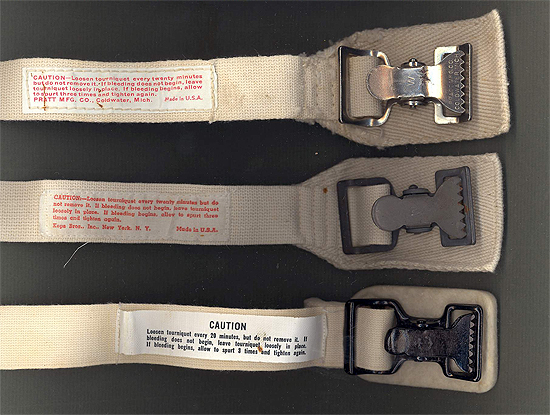
TOP: Tourniquet, manufactured by Pratt Mfg. Co., Coldwater, Michigan
MIDDLE: Tourniquet, manufactured by Kops Bros., Inc., New York, N. Y.
BOTTOM: Tourniquet, manufactured by Davis Emergency Equipment Co., Inc., Newark, New Jersey
Item 3540500 – Tourniquet, Lobectomy: Bethune (reclassified as Standard)
Item 3865000 – Tourniquet, Esmarch: Rubber, with Chain and Hook (reclassified as Standard)
Item 9378000 – Tourniquet, Field
Item 9379500 – Tourniquet, Anchor, Kirk: 2 Pieces
Item 9379700 – Tourniquet-Scissors-Forceps Set: consisting of 1 Tourniquet (Item 9378000), 1 Pair of scissors (Item 9369000), and 1 Forceps (Item 9362600); in Carton
Catalog MED 6, SETS: Small Assemblies, Kits and Chests include following Class 9 Items:
Class 9 – Subheading: Item 9331000, Supplemental Instrument Set, Fractures and Amputations, Orthopedic, Complete (1942 Model)
Item 9379500 – Tourniquet, Anchor, Kirk: 1 Set
Class 9 – Subheading: Item 9711000, Kit, Medical Noncommissioned Officer’s, Complete
Item 9378000 – Tourniquet, Field
Class 9 – Subheading: Item 9711500, Kit Medical Officer’s, Complete
Item 9378000 – Tourniquet, Field
Class 9 – Subheading: Item 9712000, Kit, Medical Private’s, Complete
Item 9378000 – Tourniquet, Field
Class 9 – Subheading: Item 9754500, Chest, Flight Service, Complete
Item 9378000 – Tourniquet, Field
Class 9 – Subheading: Item 9757000, Chest, M.D. No. 2, Complete
Item 9378000 – Tourniquet, Field: 4 Each
Class 9 – Subheading: Item 9761500, Chest, Medical Pack ”A”, Complete
Item 9378000 – Tourniquet, Field: 2 Each
Class 9 – Subheading: Item 9776500, Kit, First-Aid, Aeronautic, Complete
Item 9378000 – Tourniquet, Field
Class 9 – Subheading: Item 9777100, Kit, First-Aid, Motor Vehicle, 24-Unit, Complete
Item 9379700 – Tourniquet-Scissors-Forceps Set
Class 9 – Subheading: Item 9777300, Kit, First-Aid, Motor Vehicle, 12-Unit, Complete
Item 9379700 – Tourniquet-Scissors-Forceps Set
Class 9 – Subheading: Item 9778500, Packet, First-Aid, Parachute, Complete
Item 9378000 – Tourniquet, Field
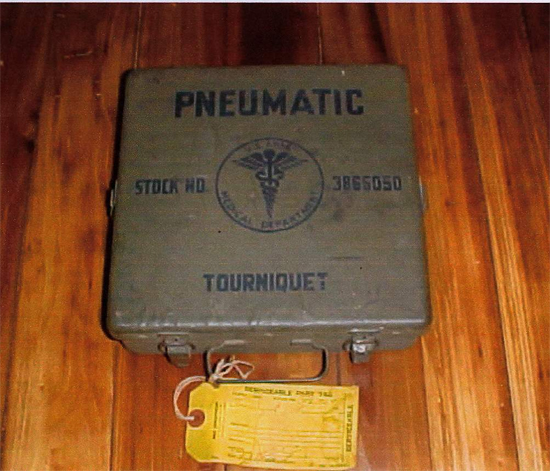
Pneumatic Tourniquet, manufactured by U.M.A. Corp., New York, N.Y.
Catalog MED 10-5 Medical Department List: Medical Supplies and Equipment authorized, but not listed in any other similar publication which include following Class 3 and Class 9 Items:
Item 3865050 – Tourniquet, Pneumatic: 1 Each
Item 9377900 – Tourniquet, Elastic, Field: 2 Each
